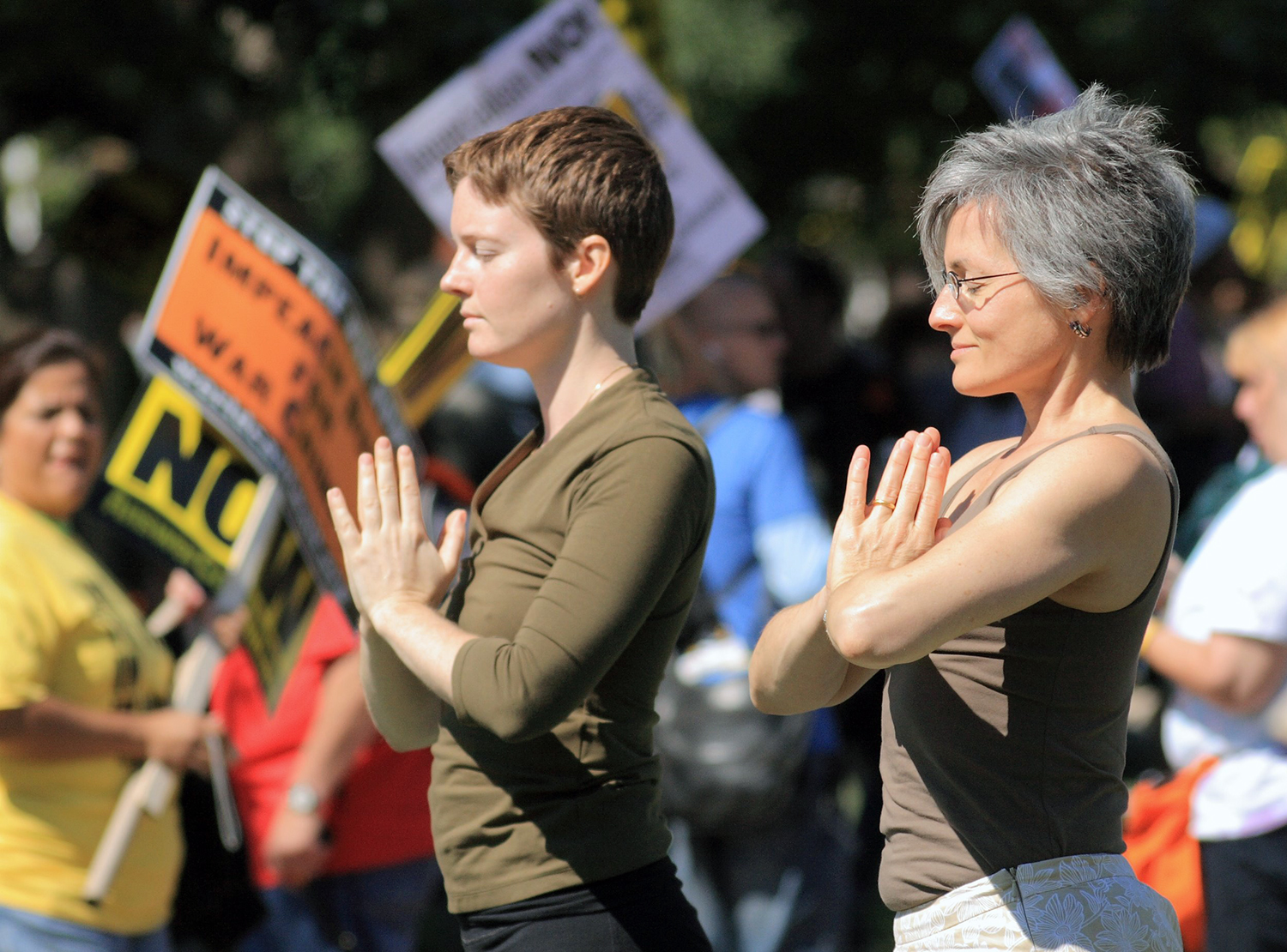Four years ago, I left a cushy tech industry job to work alongside teachers, bus drivers, and other workers in the labor movement. Burying my head in the sand and looking out for myself hadn’t been enough.
Our society is so violent, backwards, and corrupt. I had to starting helping change it.
But sometimes I struggle to square my politics with my meditation practice. How can I sit in silence as corporations exploit workers, white supremacists march in the streets, misogynists fill the White House, and the rainforests burn?
That’s why I love this metaphor from the spiritual teacher David Deida.
It reminds me that there’s room for many approaches to dealing with life’s problems, that I don’t have to choose one approach over another, and that integrating so-called “self-care” with social justice is actually the healthiest approach of all.
Imagine yourself as a stained-glass window.
“You look at yourself and notice there are pieces broken out of you,” Deida says. “There are hunks of glass missing. You’re battered, abused, chipped, wounded, rejected.”
The first approach, therapy, is like fixing or replacing altogether the broken pieces of glass. It helps you function better by healing dysfunction.
Say, you aren’t getting along with your father. Your therapist could help you forgive him for how he treated when you were young, and over time the relationship might improve.
Meditation, yoga, and other similar practices are like wiping the dust from the stained glass so the light shines through. They increase the flow of life in the present moment.
Our minds are constantly stopping the flow by following thoughts into the past or the future. Meditation is practicing letting go of thinking and observing the flow (of thoughts, bodily sensations, emotions, sounds, all of experience), over and over again.
Doing meditation (or yoga) isn’t the same as therapy. Sure, it can feel therapeutic, but it’s not meant for investigating the causes of emotional problems. It’s about being here, right now.
“You can be broken as fuck, and still do good yoga,” Deida says. “You can be entirely dysfunctional therapeutically, psychologically, emotionally, you can be a wreck, and still be a master yogi. Yoga doesn’t fix the parts of you that are broken. It just takes the dust off.”
The third approach, spirituality, isn’t about fixing the broken pieces or wiping away the dust. It’s about realizing that you’re the light itself, whether you’ve meditated, or you’re broken, or whatever’s happening. It’s realizing you are “one with everything”—there’s no separation between you and everything else.
Prayer, looking at the night sky, being in nature, and taking psychedelics are examples of spiritual experiences.
Let’s make this concrete. Say, you don’t like your job. A therapist might help you manage the stress it’s causing you. Meditation, yoga, etc., might help you feel a little better for short periods of time. Spirituality might make you realize a job is nothing relative to the 93-billion-light-years-wide universe.
You’re probably wondering, what about quitting or getting a new job?
There’s a fourth approach missing from Deida’s metaphor, which I call “political economy.” This would be like trimming the trees outside the window, i.e., changing the environment around the window so more light shines through.
As the label suggests, this is the realm of politics and economics, i.e., addressing the dysfunction outside of oneself, in society. Examples: leaving your job, starting a union with your coworkers, protesting, running for elected office, voting, starting a business, hiring a career coach, etc.
In other words, therapy helps you function better within dysfunctional conditions. Meditation helps you flow with the conditions, whatever they are. Spirituality is unconditional, i.e., finding peace and freedom no matter what. Political economy helps you change the conditions.
Meditation, therapy, and spirituality, by themselves or even all together, aren’t enough. They aren’t going to end capitalism or white supremacy or patriarchy or [insert oppressive system here.]
We also need societal change, specifically, what Martin Luther King Jr. called a “radical redistribution of economic and political power.”
Yet, raising taxes on corporations, restructuring the economy, or ending racism—which are easier said than done—won’t be enough either.
We also need to work on ourselves. It’s not one or the other.
Free meditation cheat sheet
I’ve come up with a cheat sheet to help you start and stick with a regular meditation practice. Get it for free here.
Listen to my podcast Meditation for the 99%
On Meditation for the 99%, I take meditation out of faraway monasteries,expensive retreat centers, and Corporate America, and bring it to work, relationships, and, especially, politics. Listen everywhere podcasts are available.
